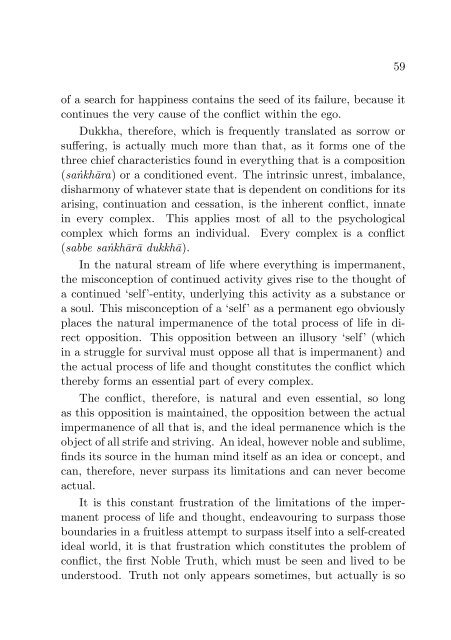Awareness in Buddhist Meditation
A detailed description of awareness in Buddhist Meditation.
A detailed description of awareness in Buddhist Meditation.
Create successful ePaper yourself
Turn your PDF publications into a flip-book with our unique Google optimized e-Paper software.
59<br />
of a search for happ<strong>in</strong>ess conta<strong>in</strong>s the seed of its failure, because it<br />
cont<strong>in</strong>ues the very cause of the conflict with<strong>in</strong> the ego.<br />
Dukkha, therefore, which is frequently translated as sorrow or<br />
suffer<strong>in</strong>g, is actually much more than that, as it forms one of the<br />
three chief characteristics found <strong>in</strong> everyth<strong>in</strong>g that is a composition<br />
(saṅkhāra) or a conditioned event. The <strong>in</strong>tr<strong>in</strong>sic unrest, imbalance,<br />
disharmony of whatever state that is dependent on conditions for its<br />
aris<strong>in</strong>g, cont<strong>in</strong>uation and cessation, is the <strong>in</strong>herent conflict, <strong>in</strong>nate<br />
<strong>in</strong> every complex. This applies most of all to the psychological<br />
complex which forms an <strong>in</strong>dividual. Every complex is a conflict<br />
(sabbe saṅkhārā dukkhā).<br />
In the natural stream of life where everyth<strong>in</strong>g is impermanent,<br />
the misconception of cont<strong>in</strong>ued activity gives rise to the thought of<br />
a cont<strong>in</strong>ued ‘self’-entity, underly<strong>in</strong>g this activity as a substance or<br />
a soul. This misconception of a ‘self’ as a permanent ego obviously<br />
places the natural impermanence of the total process of life <strong>in</strong> direct<br />
opposition. This opposition between an illusory ‘self’ (which<br />
<strong>in</strong> a struggle for survival must oppose all that is impermanent) and<br />
the actual process of life and thought constitutes the conflict which<br />
thereby forms an essential part of every complex.<br />
The conflict, therefore, is natural and even essential, so long<br />
as this opposition is ma<strong>in</strong>ta<strong>in</strong>ed, the opposition between the actual<br />
impermanence of all that is, and the ideal permanence which is the<br />
object of all strife and striv<strong>in</strong>g. An ideal, however noble and sublime,<br />
f<strong>in</strong>ds its source <strong>in</strong> the human m<strong>in</strong>d itself as an idea or concept, and<br />
can, therefore, never surpass its limitations and can never become<br />
actual.<br />
It is this constant frustration of the limitations of the impermanent<br />
process of life and thought, endeavour<strong>in</strong>g to surpass those<br />
boundaries <strong>in</strong> a fruitless attempt to surpass itself <strong>in</strong>to a self-created<br />
ideal world, it is that frustration which constitutes the problem of<br />
conflict, the first Noble Truth, which must be seen and lived to be<br />
understood. Truth not only appears sometimes, but actually is so

















